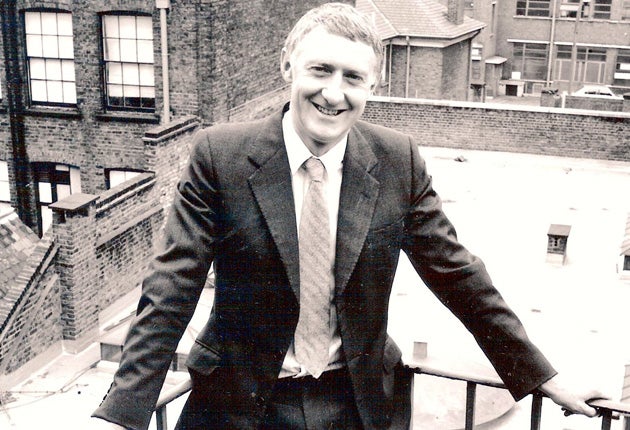Sir Henry Hodge: Lawyer who championed the causes of children and immigrants and later became a High Court judge

Henry Hodge, who died last week at the young age of 65, was an inspirational lawyer and one of the outstanding lawyers of his generation. His great success as a lawyer, however, should not blind us to the thread that ran through Henry's career, namely his commitment to use the law and his considerable talents in the service of those less fortunate, with the aim of making the law fair and accessible to all.
This commitment was much in evidence when I first met Hodge in 1974. At that time he was a newly qualified solicitor, working for the Child Poverty Action Group, where he developed the successful test-case strategy. This challenged government decisions on benefits through the courts. He was frequently successful and on more than one occasion the government was forced to change the law and rules as a result of victories he achieved.
Henry Hodge was born on 12 January 1944 and read law at Balliol, Oxford. He spent five years working for the Child Poverty Action Group, then in 1977 he set up the solicitors firm Hodge, Jones and Allen in Camden Town, London, with Peter Jones and Patrick Allen. They had no capital but managed to persuade Bert Enright, the local Midland bank manager, to lend them each £2,500, which enabled the firm to begin business from offices in Camden High Street above the Archway Loan company.
From the outset the firm was committed to providing a first-rate service to those of limited means. Legal aid, as it was then called, paid the fees of most of the firm's clients. It was never easy financially and over the years Hodge fronted many emergency trips to see Bert when the overdraft went over the limit. Hodge's height at over six feet, and the air of gravitas he could assume when it was needed, stood the firm in good stead with the bank.
Hodge, Jones and Allen was and is a full-service law firm with criminal, housing family, litigation and conveyancing departments. While most solicitors specialised, Hodge did not and turned his hand to everything – and did everything well. He was a generalist solicitor in an age of increasing specialisation. In his latter years in private practice he specialised in immigration work, and returned to this when he was appointed a Judge.
Hodge was also a formidably hard worker, often in the office while the rest of the world slept. He was a natural leader and the obvious choice to be Hodge, Jones and Allen's senior partner when the firm became large enough to need one. The firm is a fitting tribute to his vision. Today it employs over 180 people and is one of the largest providers of publicly funded legal services in the country.
Hodge was appointed a circuit judge and in 2004 was promoted to the High Court Bench. He was only the third solicitor to achieve this. He was appointed the chief immigration adjudicator in 2001 and president of the Asylum and Immigration Tribunal after his appointment as a High Court judge. He was proud of the fact that while he was chief immigration adjudicator he cleared the backlog of immigration appeals, and made the whole system much more efficient.
Hodge was involved in voluntary organisations including the Legal Action Group, Liberty and the Family Rights Group which he and I set up with others to work for improvements in the law and practice relating to children being taken into care. Until he became a judge he was a member of the Labour Party and worked hard for it over many years.
Hodge's commitment to hard work did not prevent him enjoying life to the full. He was a great party animal and enormous fun. He had a lifelong passion for motorbikes and Arsenal FC, where he was a season ticket holder. He loved gardening and going to the pub.
He was also a good and loyal friend to very many of us. Friends who needed help and support always got it. Most of all he was a devoted father to Nicky, Lizzie, Anna and Amy and a wonderful husband to his beloved wife Margaret, who looked after him so beautifully during his long illness.
In September 2008 Hodge was diagnosed with acute myeloid leukaemia having been ill for over a year before that with heart problems, which necessitated many hospital admissions. The treatment was very difficult and Hodge spent most of the time since the diagnosis in University College Hospital. He endured four sessions of chemotherapy and a bone marrow transplant. He was often poorly and must often have felt very unwell. None the less he presented a cheerful disposition to his many visitors and was always pleased to see them and grateful for whatever they brought.
Maggie Rae
Henry Egar Garfield Hodge, solicitor and judge: born 12 January 1944; Solicitor and Deputy Director, Child Poverty Action Group, 1972–77; Senior Partner, Hodge Jones & Allen, Solicitors, 1977–99; Assistant Recorder, 1993–97; OBE, 1993; a Recorder, 1997–99; a Circuit Judge, 1999–2004; Chief Immigration Adjudicator, 2001–04; Member (Labour), Islington Borough Council, 1974–78; Chairman, Race Relations Committee, 1992–94; Chairman, Equal Opportunities Committee, 1994–95; a Judge of the High Court of Justice, Queen's Bench Division, 2004-; President, Asylum and Immigration Tribunal, 2005-; Kt 2004; married 1971 Miranda Tufnell (marriage dissolved 1975), 1978 Margaret Oppenheimer (two daughters, one stepson, one stepdaughter); died 18 June 2009.
Subscribe to Independent Premium to bookmark this article
Want to bookmark your favourite articles and stories to read or reference later? Start your Independent Premium subscription today.

Join our commenting forum
Join thought-provoking conversations, follow other Independent readers and see their replies